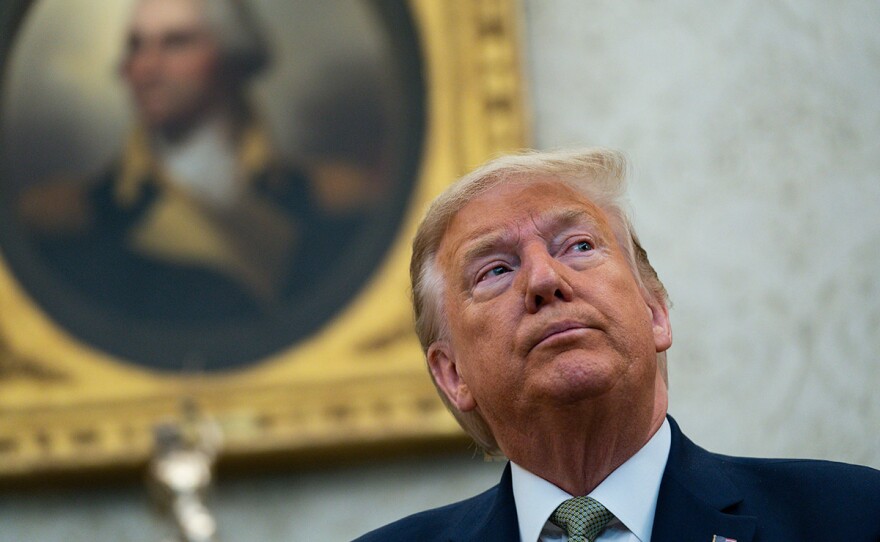Defending his handling of the coronavirus pandemic, an angry President Donald Trump on Friday lashed out at reporters and broke with his own health officials on the science of the outbreak.
Trump said he was tapping the Defense Production Act to order American businesses to manufacture and send supplies, like testing kits, ventilators and masks, to hospitals preparing to be overwhelmed by a wave of coronavirus cases. But he gave conflicting accounts as to when he officially invoked the rarely used order — and even if he had ultimately done so — and did not specify which companies he was marshaling for the effort. Trump had said earlier in the week he would tap the act as needed; he then added Friday that he has put that “in gear.”
The president also announced an effective closure of the U.S. border with Mexico, prohibiting most travel except for trade. That brings it in line with the restriction on the Canadian border earlier this week. The U.S. is also suspending interest on student loans to help young people cope with job losses and the financial crunch.
As Congress debated a financial relief package that could reach $1 trillion, officials again urged Americans to maintain social distancing. Dr. Anthony Fauci, the nation's top infectious disease expert, applauded strict new measures put in place by the governors of California and New York to limit mobility.
But Trump and Fauci broke openly during the White House briefing on the possible effectiveness of new drugs being explored to treat the virus. Trump said he believed that a combination of medications he announced Thursday would work to treat the virus. Fauci said no such declaration could be made without testing, again highlighting the sharp divide between data-driven health officials and a president who admits he follows his gut.
The president spent much of the Friday briefing in a fury, sparring with reporters he deemed overly critical of the response. And he again painted an unrealistically rosy picture of the outlook, as doctors and nurses have already made desperate appeals for help even as the anticipated wave of new patients has yet to hit.
Trump scoffed at questions about continued testing shortfalls and deficiencies in medical supplies, suggesting that even mentioning the issues was problematic. When asked to speak directly to those marooned at home and frightened, Trump voiced objection to the question itself.
“I say that you’re a terrible reporter,” Trump responded.
"I think it's a very bad signal that you're putting out to the American people,” he added. "The American people are looking for answers and they're looking for hope. And you’re doing sensationalism.”
Vice President Mike Pence, when asked the same question later in the briefing, responded, “Don't be afraid, be vigilant."
More than 200 people have died from COVID-19 in the U.S. and sickness from the disease is on the rise, with hospitals at risk of being overrun. Most people who get it have only mild or moderate symptoms, such as fever and cough. For some, especially older adults and people with existing health problems, it can cause more severe illness, including pneumonia.
Senate Democratic leader Chuck Schumer said he implored Trump during a phone call Friday morning to invoke the Korean War-era act immediately to order the manufacture of ventilators and other critically needed medical gear. The president told Schumer he would and then could be heard on the telephone yelling to someone in his office to do it now, said Schumer's spokesman, Justin Goodman.
Later at the briefing, Trump said he had actually activated the measure Thursday night. He declined to reveal any companies he had ordered to step up production, though, and then walked back his claim, saying, “You know, so far, we haven't had to” because companies are volunteering.
The president and the Cabinet officials who briefed reporters focused on the border as they moved to restrict the entry of people without documentation. This follows a stepped-up State Department travel advisory telling Americans they should not leave the country.
On another front, Trump said the Education Department will not enforce standardized testing requirements for students in elementary through high school for the current year. Under federal education law, states are required to administer standardized tests every school year.
“Americans from every walk of life are coming together,” Trump said. “We are winning and we are going to win this war.”
The administration is trying to overcome its inability to provide the needed masks, ventilators and other supplies to hospitals on the verge of being overwhelmed by coronavirus patients. Already doctors and nurses have been making desperate public pleas. And numerous local officials, including New York City Mayor Bill de Blasio, have warned that their medical facilities will shortly run out of vital supplies, endangering both patients and health care workers.
On Capitol Hill, lawmakers have been working toward an aid package to prop up households and the U.S. economy that would put money directly into Americans' pockets. The president has embraced the stimulus, believing it is needed to stabilize the economy and stock markets, which have been pummeled by the crisis.
Mere weeks ago, Trump expected to be campaigning for reelection on the strength of a robust economy and now the nation is staring at a recession, if not worse — a difficult hand for any incumbent to play.
According to the World Health Organization, people with mild illness recover in about two weeks, while those with more severe illness may take three to six weeks to recover.





